
Jethro Tull are a British progressive rock band formed in Blackpool, Lancashire, in 1967. Initially playing blues rock and jazz fusion, the band soon incorporated elements of English folk music, hard rock and classical music, forging a signature progressive rock sound. The group's lead vocalist, bandleader, founder, principal composer and only constant member is Ian Anderson, who also plays flute and acoustic guitar. The group has featured a succession of musicians throughout the decades, including significant contributors such as guitarists Mick Abrahams and Martin Barre ; bassists Glenn Cornick, Jeffrey Hammond, John Glascock, Dave Pegg, Jonathan Noyce and David Goodier; drummers Clive Bunker, Barrie "Barriemore" Barlow and Doane Perry; and keyboardists John Evan, Dee Palmer, Peter-John Vettese, Andrew Giddings and John O'Hara.

Aqualung is the fourth studio album by the British progressive rock band Jethro Tull, released on 19 March 1971, by Chrysalis Records. It is widely regarded as a concept album featuring a central theme of "the distinction between religion and God", though the band have said there was no intention to make a concept album, and that only a few songs have a unifying theme. Aqualung's success signalled a turning point in the career of the band, which went on to become a major radio and touring act.
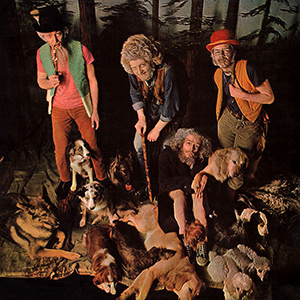
This Was is the debut studio album by the British rock band Jethro Tull, released in October 1968. Recorded at a cost of £1200, it is the only Jethro Tull album with guitarist Mick Abrahams, who was a major influence for the sound and music style of the band's first songs. When the album was released the band was performing regularly at the Marquee Club in London, where other successful British groups, such as the Rolling Stones and the Who, had started their careers.

Stand Up, released in 1969, is the second studio album by British rock band Jethro Tull. It was the first Jethro Tull album to feature guitarist Martin Barre, who would go on to become the band's longtime guitarist until its initial dissolution in 2012. Before recording sessions for the album began, the band's original guitarist Mick Abrahams departed from the band as a result of musical differences with frontman and primary songwriter Ian Anderson; Abrahams wanted to stay with the blues rock sound of their 1968 debut, This Was, while Anderson wished to add other musical influences such as folk rock.

Minstrel in the Gallery is the eighth studio album by British rock band Jethro Tull, released in September 1975. The album sees the band going in a different direction from their previous work War Child (1974), returning to a blend of electric and acoustic songs, in a manner closer to their early 1970s albums such as Benefit (1970), Aqualung (1971) and Thick as a Brick (1972). Making use of a newly constructed mobile recording studio commissioned and constructed specifically for the band, the album was the first Jethro Tull album to be recorded outside of the UK, being recorded in tax exile in Monte Carlo, Monaco.

War Child is the seventh studio album by Jethro Tull, released in October 1974. It was released almost a year and a half after the release of A Passion Play. The turmoil over criticism of the previous album surrounded the production of War Child, which obliged the band to do press conferences and explain their plans for the future.

Benefit is the third studio album by the British rock band Jethro Tull, released in April 1970. It was the first Tull album to include pianist and organist John Evan – though he was not yet considered a permanent member of the group – and the last to include bass guitarist Glenn Cornick, who was fired from the band upon completion of touring for the album. It was recorded at Morgan Studios, the same studio where the band recorded its previous album Stand Up; however, they experimented with more advanced recording techniques.
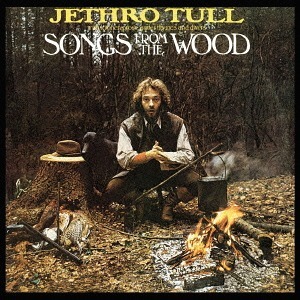
Songs from the Wood is the tenth studio album by British progressive rock band Jethro Tull, released on 11 February 1977 by Chrysalis Records. The album is considered to be the first of three folk rock albums released by the band at the end of the 1970s, followed by Heavy Horses (1978) and Stormwatch (1979).

Martin Lancelot Barre is an English guitarist best known for his longtime role as lead guitarist of British rock band Jethro Tull, with whom he recorded and toured from 1968 until the band's initial dissolution in 2011. Barre played on all of Jethro Tull's studio albums from their 1969 album Stand Up to their 2003 album The Jethro Tull Christmas Album. In the early 1990s he began a solo career, and he has recorded several albums as well as touring with his own live band.
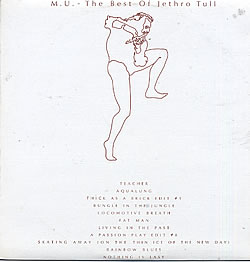
M.U. – The Best of Jethro Tull, released in 1976, is the first proper greatest hits album by Jethro Tull. It spans the years 1969 to 1975. The earlier Living in the Past (1972) compilation mainly dealt with non-album material, but this album only features one previously unreleased song, "Rainbow Blues".

"Locomotive Breath" is a song by British progressive rock band Jethro Tull from their 1971 album, Aqualung.

Living in the Past is a double LP compilation album by Jethro Tull, released in 1972. It collects album tracks, outtakes and several standalone singles spanning the band's career up to that point. Also included are the 1971 "Life Is a Long Song" EP and two live recordings taken from a performance at New York City's Carnegie Hall in November 1970.

"Living in the Past" is a song by British progressive rock group Jethro Tull. It is one of the band's best-known songs, and it is notable for being written in the unusual 5
4 time signature. The use of quintuple meter is quickly noted from the beginning rhythmic bass pattern, though it can also be explained as a distinct 6
8 + 2
4 syncopated rhythm.
"Sunshine Day" is a song recorded by British progressive rock group Jethro Tull and released as the A-side of the group's debut single. It was recorded on 6-7 January 1968 at CBS Studios in London, and the single released on 16 February 1968 by MGM Records, in the UK only. The B-side, "Aeroplane", was recorded on 22 October 1967 at EMI Studios, London, under the artist name "John Evan Band". Both tracks were produced by Derek Lawrence, who is also credited with purposely designating the band as 'Jethro Toe'. Apparently, he did not like the name 'Jethro Tull'.

"Hymn 43" is a song by British progressive rock group Jethro Tull. It is off their Aqualung album and was released as a single by Reprise Records. The song reached No. 91 on the Billboard Hot 100.

"Bungle in the Jungle" is a song by British progressive rock band Jethro Tull. It was released on their album War Child in 1974.
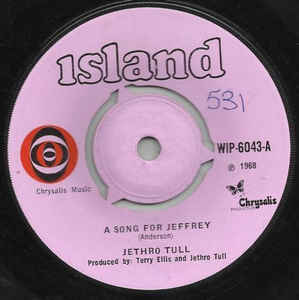
"A Song for Jeffrey" is a song recorded by the English rock band Jethro Tull, released as their second single in the UK, and as the B-side to "Love Story" in the US. The "Jeffrey" of the title is Ian Anderson's friend and future Jethro Tull bassist Jeffrey Hammond, who was "a slightly wayward lad who wasn’t quite sure where he was headed in life".
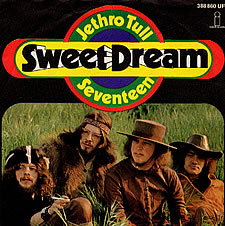
"Sweet Dream" is a song recorded by the English rock band Jethro Tull on 31 August 1969, at Morgan Studios, London. It was their second straight UK Top Ten single, reaching number 7 in the UK singles chart. The b-side was a non-album track, "17", recorded on 11 September 1969, also at Morgan. It later appeared as a bonus track on remastered versions of Stand Up. "Sweet Dream" has appeared on many Tull compilation albums, while "17" has been rarely seen. In the UK, the single was the first release on Chrysalis Records.

"The Witch's Promise" is a single by the British rock band Jethro Tull, released in January 1970, on the Chrysalis label. It reached No. 4 in the UK Singles Chart, and was promoted by an appearance on the British chart show Top of the Pops. The B-side was "Teacher", an alternate version of which later appeared on the US release of the album Benefit. In the U.S., the single was released on the Reprise label.
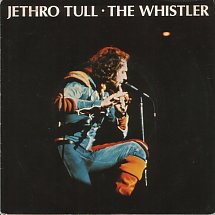
"The Whistler" is a song by English rock band Jethro Tull from their 1977 album Songs from the Wood. Written by frontman Ian Anderson, it features a folk-rock style that characterizes the Songs from the Wood album.



















